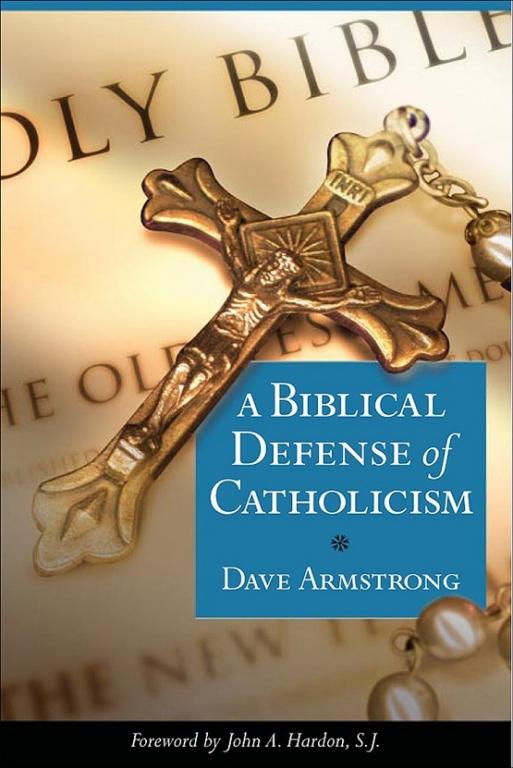
From my book, A Biblical Defense of Catholicism (completed in 1996, published by Sophia Institute Press in 2003; pp. 39-50, minus a lengthy citation of Al Kresta).
*****
1 Corinthians 6:11 (RSV): “And such were some of you. But you were washed, you were sanctified, you were justified in the name of the Lord Jesus Christ and in the Spirit of our God.”
There is much here that indicates the Catholic view of the doctrines under present consideration: washing (baptismal regeneration), sanctification, justification, and even the Holy Spirit (and the Trinity). Protestant “dogma” attempts to separate all four elements, to more or less degrees. Granted, it isn’t logically certain that the three acts or processes are equivalent in this particular text, but at any rate, St. Paul is surely associating them together closely, as in Catholic teaching.
Baptism and regeneration are often correlated in Scripture: Jesus says we must be “born of water and the Spirit” to enter God’s kingdom (John 3:5). Many Protestants rather desperately claim that the water refers to childbirth! St. Peter informs us that “Baptism . . . now saves you” (1 Pet. 3:21). St. Paul writes that “He saved us . . . by the washing of regeneration” (Titus 3:5) and equates Baptism with “put[ting] on Christ” (Gal. 3:27). Catholics do not hold that Baptism alone is sufficient for eternal salvation (assuming a person lives for a while after it) and interpret these verses in harmony with the rest of the biblical teaching of salvation as a lifelong process of perseverance. On the other hand, the Protestant must admit that there is definitely more to these verses than mere symbolism. We do indeed see here baptismal regeneration, by which the newly baptized initiate is sanctified and made holy — all of which is consistent with infused justification.
[ . . . ]
Romans 2:5-13: “But by your hard and impenitent heart you are storing up wrath for yourself on the day of wrath when God’s righteous judgment will be revealed. For he will render to every man according to his works: To those who by patience in well-doing seek for glory and honor and immortality, he will give eternal life; but for those who are factious and do not obey the truth, but obey wickedness, there will be wrath and fury. There will be tribulation and distress for every human being who does evil, the Jew first and also the Greek, but glory and honor and peace for everyone who does good, the Jew first and also the Greek. For God shows no partiality. All who have sinned without the law will also perish without the law, and all who have sinned under the law will be judged by the law. For it is not the hearers of the law who are righteous before God, but the doers of the law who will be justified.”
Judgment, according to St. Paul in his quintessential treatise on salvational theology, his letter to the Romans, is according to works, just as Christ also explicitly taught. This is a theme that runs through St. Paul’s writings (for example, 1 Cor. 3:13, 4:5; 2 Cor. 5:10; Gal. 6:7-9; Col. 3:23-25). That this is the case is admitted even by staunchly Reformed evangelical theologians, such as G. C. Berkouwer. [Faith and Justification (Studies in Dogmatics), Lewis B. Smedes, trans. (Grand Rapids, Michigan: Eerdmans, 1954), 103-105]
This passage easily synthesizes with Catholic soteriology, but is shockingly dissimilar to Protestant thought. To summarize: The concept of “demerits” is present (verse 5). Differential rewards for works (by implication, differential “merit”) exist (verse 6). Eternal life is correlated with well-doing (verses 7, 10). Divine wrath is due to disobedience (verses 8, 9). Obedient doers of the law shall be justified (verse 13; a striking similarity to James 1:2223; 2:24).
The theme of obeying the gospel, or the obedience of faith, is also common in St. Paul’s writings (for example, Rom. 1:5, 6:17, 10:16, 15:18-19, 16:25-26; 2 Thess. 1:8; cf. Acts 6:7; Heb. 11:8).
Romans 3:28: “For we hold that a man is justified by faith apart from works of law.”
Hartmann Grisar, the great Jesuit scholar and biographer of Luther, asserts:
Here he merely excludes the works “of the law,” i.e., according to the context such works as do not rest on faith but precede faith, whether the purely outward works of the Mosaic ceremonial law, or other natural works done apart from, or before, Christ. [Luther, E. M. Lamond, trans., Luigi Cappadelta, ed. (London: Kegan Paul, Trench, Trubner and Co., 1917), Vol. 1, 309]
This is the verse to which Luther, with no basis in the Greek text, arbitrarily added the word alone after the word faith in his German translation, in order to bolster his novel doctrine of sola fide. The notion of “faith alone” does, however, occur in the Bible twice, in James 2:17 and 2:24, where it is condemned. It comes as no surprise, then, to learn that Luther described the book of James as an “epistle of straw” and regarded it as an inferior, second-tier book of the New Testament (and in fact nearly threw it out altogether).
Romans 5:17-19: “If, because of one man’s trespass, death reigned through that one man, much more will those who receive the abundance of grace and the free gift of righteousness reign in life through the one man Jesus Christ. Then as one man’s trespass led to condemnation for all men, so one man’s act of righteousness leads to acquittal and life for all men. For as by one man’s disobedience many were made sinners, so by one man’s obedience many will be made righteous.”
It seems unlikely, in light of the clear parallelism in verse 19 (“made sinners . . . made righteous”) that the righteousness is merely imputed, since all agree that Original Sin is actual. Likewise, verse 17 gives us a clue as to St. Paul’s meaning, since it refers to a received “abundance of grace” and “the gift of righteousness” — phrases that are more in line with infused justification.
1 Corinthians 3:8-9: “Each shall receive his wages according to his labor. For we are God’s fellow workers; you are God’s field, God’s building.”
1 Corinthians 15:10: “But by the grace of God I am what I am, and his grace toward me was not in vain. On the contrary, I worked harder than any of them, though it was not I, but the grace of God which is with me” (see also 1 Cor. 15:58; Gal. 5:6, 6:7-9).
St. Paul again regards faith and the human cooperation of works (labor) as two sides of the same coin, both proceeding from grace. Elsewhere, the apostle writes of the “works of faith” and related concepts (1 Thess. 1:3; 2 Thess. 1:11; Titus 1:15-16). Faith and works are not at all incompatible in all these Pauline passages. Salvation is described as a struggle, a process, a goal — not merely an abstract, past, instantaneous event.
As we labor faithfully as Jesus’ disciples, we store up corresponding rewards (1 Cor. 3:8; cf. 1 Tim. 6:18-19): the idea of merit (which most Protestants deny). It is by virtue of our union with our Lord Jesus Christ that our actions — worthless in and of themselves — become meritorious.
2 Corinthians 5:17: “If anyone is in Christ, he is a new creation; the old has passed away; behold, the new has come.”
The curious thing here (for the Protestant) is the seemingly instantaneous change of sanctification, which would accompany justification. If “all things are new” (as in the KJV), how does this square with mere declaratory, forensic, extrinsic justification? The whole drift of the passage seems to be actual transformation in the person now in Christ, whereas in Protestant justification, only the individual’s “legal” standing with God is changed. In fact, justification and sanctification are intimately related aspects of our ultimate salvation.
Ephesians 2:8-10: “For by grace you have been saved through faith; and this is not your own doing; it is the gift of God — not because of works, lest any man should boast. For we are his workmanship, created in Christ Jesus for good works, which God prepared beforehand, that we should walk in them.”
The first portion of this passage (2:8-9) is one of the most frequently used biblical citations in Protestant evangelistic circles. What is noteworthy upon reflection is how verse 10 clarifies the two preceding verses. When it is included in proper context, we see that works are not antithetical to faith, but rather, the necessary “outworking” of it. In verses 8 and 9, St. Paul is stressing the causational primacy of grace and faith, and the futility of mere human works not preceded by grace. But in verse 10 he teaches that good works ordained by God, and always proceeding from His grace, are equally part of salvation and justification. The whole passage is more in accord with Catholic both-and thinking than with the Protestant either-or dichotomous perspective.
Philippians 2:12-13: “Work out your own salvation with fear and trembling; for God is at work in you, both to will and to work for his good pleasure.”
Cardinal Newman elaborates:
In truth, the two doctrines of the sovereign and overruling power of divine grace, and man’s power of resistance, need not at all interfere with each other. They lie in different provinces, and are (as it were) incommensurables. Thus St. Paul evidently accounted them; else he could not have introduced the text in question with the exhortation, “Work out or accomplish your own salvation with fear and trembling,” for it is God which worketh or acts in you. So far was he from thinking man’s distinct working inconsistent with God’s continual aiding, that he assigns the knowledge of the latter as an encouragement to the former. . . .
It is quite certain that a modern Predestinarian never could have written such a sentence [as Phil. 2:12-13]. [Sermon: “Human Responsibility,” 1835]
Titus 3:5-8: “He saved us, not because of deeds done by us in righteousness, but in virtue of his own mercy, by the washing of regeneration and renewal in the Holy Spirit, which he poured out upon us richly through Jesus Christ our Savior, so that we might be justified by his grace and become heirs in hope of eternal life. . . . Those who have believed in God may be careful to apply themselves to good deeds; these are excellent and profitable to men.”
Here St. Paul refers to Baptism (verse 5: “washing of regeneration”) and says we are saved in the sense of initial justification. That this is a conditional security, we have seen from several other passages already considered, and more to come. Assuming for the sake of argument that the salvation here spoken of is permanent and “eternally secure,” the Evangelical would still have to extricate himself from the position of baptismal regeneration, which most Protestants deny vehemently. Once again, St. Paul utilizes a beautifully symmetrical argument, such as in Philippians 2:12-13 and Ephesians 2:8-10, balancing complementary aspects (which are often unnecessarily dichotomized by Protestantism).
Most interesting is the use of deeds in two different senses in the same passage. In verse 5, he teaches that we cannot be saved by purely human works, preceding the grace of God (that is, the heresy of Pelagianism is denied). But in verse 8, he urges in very strong terms that good deeds are profitable, as indeed he often stresses elsewhere in several ways.
Catholics need not minimize the aspects of St. Paul’s teaching that deal with human responsibility, nor set his teaching on works against his supposed teaching on extrinsic justification, nor his predestinarian texts against his numerous exhortations of vigilance and watchfulness concerning one’s own state of friendship with God, nor oppose him to St. James or our Lord Jesus, etc. When the whole teaching of the Bible is taken into consideration (as objectively as humanly possible), the synthesis arrived at will be seen to be not unlike that which has been maintained in the Catholic Church, with increasing fullness as time goes on.
***













